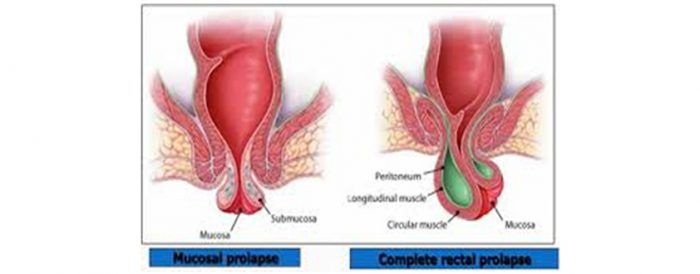What is Rectal Prolapse?

What are the causes of Rectal Prolapse?
Rectal prolapse can occur as a result of many conditions, including:
- Chronic Constipation or Chronic Diarrhea
- The long-term history of straining during bowel movements.
- Older age.
- The weakening of the anal sphincter.
- Prior injury to the anal or pelvic areas.
What are the symptoms of Rectal Prolapse?
A person with a prolapsed rectum may feel tissue protruding from the anus and experience the following symptoms:
- Pain during bowel movements.
- Mucus or blood discharge from the protruding tissue.
- Fecal incontinence (inability to control bowel movements)
- Loss of urge to defecate (mostly with larger prolapses)
What are treatment options for Rectal Prolapse?
Nonoperative ManagementGenerally, a prolapsed rectum can be reduced with gentle digital pressure. Although no medical treatment is available for rectal prolapse, internal prolapse should always be first treated medically with bulking agents, stool softeners, and suppositories or enemas.
Operative managementSurgical approaches in rectal prolapse can be either perineal or abdominal. A perineal approach (or trans-perineal) refers to surgical access to the rectum and sigmoid colon via an incision around the anus and perineum (the area between the genitals and the anus). Abdominal approach (trans-abdominal approach) involves the surgeon cutting into the abdomen and gaining surgical access to the pelvic cavity. Procedures for rectal prolapse may involve fixation of the bowel (mesh or suture rectopexy), or resection (a portion removed), or both. Abdominal operations may be open or laparoscopic (keyhole surgery)
Laparoscopic proceduresRecovery time following laparoscopic surgery is shorter and less painful than following traditional abdominal surgery. Rectopexy and anterior resection have been performed laparoscopically with good results.
Dr. Arun Bhardwaj at +91-8506856072, 9716972820